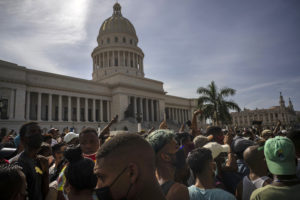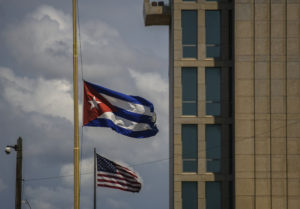WOLA Statement
December 3, 2014 marks the fifth anniversary of the arrest in Cuba of Alan Gross, a U.S. Agency for International Development (USAID) subcontractor. Mr. Gross was visiting Cuba under the auspices of a USAID “democracy promotion” program to provide equipment to enable internet access to groups within the island’s small Jewish community and other organizations. On Mr. Gross’s fifth trip to the island, Cuban authorities arrested him, charged him with subversive activities, and eventually sentenced him to 15 years in prison.
Mr. Gross was working as a U.S. government subcontractor at the time he was arrested, and the U.S. government should make it a priority to secure his release. The Obama administration’s repeated calls to Cuban authorities to free Mr. Gross unconditionally have not worked. In the meantime, the Cuban government has come to equate the case of Mr. Gross with that of five Cuban intelligence agents who were arrested, tried, and convicted in Miami in the late 1990s on a variety of espionage-related charges. Known as the Cuban Five, two of them have since completed their sentences in U.S. prisons, while three others remain in prison, including one sentenced to two life terms.
An alternative approach to securing Mr. Gross’s release is not only warranted, it is long overdue. Resolving the Gross situation through a humanitarian exchange or other dialogue that brings Mr. Gross home would fulfill our government’s responsibility to someone indirectly in its employ at the time of his arrest. On this fifth anniversary of Mr. Gross’s arrest, WOLA calls on the Obama administration to engage in a serious dialogue with the Cuban government to secure his release, keeping in mind the following points:
- In order for the Cuban government to come to the negotiating table, the Obama administration needs to signal a willingness to engage in serious, meaningful dialogue about the issues that matter to Cuba. First and foremost, these issues include the imprisonment of the three Cuban agents. The Cuban government has insisted that any discussion about a resolution of the Gross case must include a negotiation about the remaining three Cuban agents. Their case—including sentences, probation, and current living situations—will continue to be a priority for Cuba. None of this is to suggest that the United States should simply accept Cuban demands; however, negotiations need to recognize the issues that are on the table, and all parties involved need to be willing to address them.
- There is ample precedent for the United States to negotiate the reciprocal release of Mr. Gross and the remaining Cuba agents held in U.S. custody. While not directly parallel, the Carter administration in 1979 secured the release of four CIA agents held by the Cuban government by granting clemency to three imprisoned Puerto Rican nationalists who had opened fire in the U.S. Congress in 1954. In 1963, the United States and Cuba negotiated a same-day release of prisoners that included 27 U.S. citizens arrested in Cuba and four Cubans imprisoned in the United States.
- The window of opportunity for President Obama to secure the release of Mr. Gross is rapidly closing. In April 2014, he went on a hunger strike to protest the lack of action on the part of the U.S. and Cuban governments. In June, he informed his lawyer that he intends to come home to the United States within the next year “dead or alive,” and his wife has repeatedly voiced concerns that he will “do something drastic.”
Contact
Ana Sorrentino
WOLA Program Officer
202-797-2171
asorrentino@wola.org
Photo courtesy of National Security Archive.


